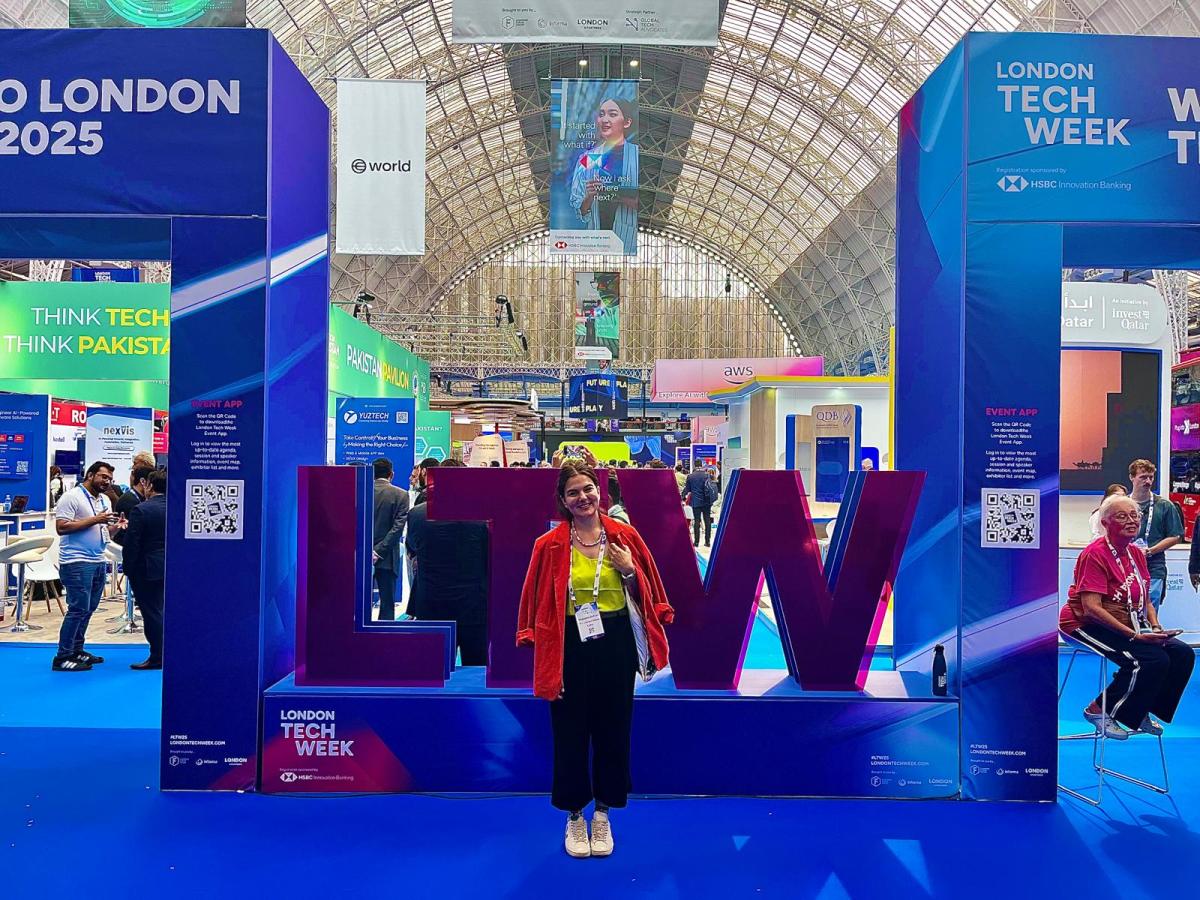Reflections on London Tech Week 2025: innovation, inclusion, and the intersection of technology and parenthood
25 June 2025
Magdalena Drafiova, Collaboration Manager for the Edinburgh International Data Facility, shares her insights.

Magdalena at London Tech Week 2025.
Earlier this month the Olympia Exhibition Centre in West London was transformed into the epicentre of global technology discussions during London Tech Week. I spent six years of my career and completed my postgraduate degree in London, and returning to attend this high-profile event filled me with excitement and nostalgia as I was eager to reconnect with the dynamic world of tech innovation.
The fusion of innovation and academia
My primary goal in attending was to learn about advances in technology, forge new connections, and explore collaboration opportunities. This evolved when I became part of the energetic booth of Edinburgh Innovations (with excellent colleagues Marina Duka, Lynn McMath, Kerena Hendry, Mark Baillie, Gregor McElvogue, Stephanie Peebles and Katy Guthrie) - a unit of the University of Edinburgh. Their mission was to highlight the University's role in shaping policies regarding AI, supercomputing and data, and to place it at the forefront of technological evolution through strategic industry partnerships and cutting-edge infrastructure, such as the Edinburgh International Data Facility (EIDF) and EPCC, which I represented.
Being part of this mission was exciting. Between attending talks, engaging in conversations with other attendees, and visiting various stands, I felt like more than just an attendee; I was a representative of a transformative wave in technology, advocating for the application of ethical AI and the integration of systems thinking within technological advancements and the infrastructure that supports such work.
Navigating the tech labyrinth
The diversity of exhibitors was striking. London Tech Week showcased it all, from an AI "quick health check" booth focused on preventative medicine to significant tech corporations, startups, and countries like Romania and Pakistan presenting outsourcing opportunities. Notably only two UK academic organisations - the universities of Oxford and Edinburgh - were visible among the exhibitors. Each booth offered a glimpse into different offerings, whether it was consultancy services, new materials, or AI models.
Prime Ministerial insights
A standout moment was the keynote address by Sir Keir Starmer, the UK Prime Minister, which I attended with high expectations. His words resonated with the audience as he painted a vision of the UK as a thriving hub for artificial intelligence (AI). He announced significant funding aimed at further realising this vision, transforming it into a tangible future with enhanced public infrastructure and increased job opportunities through AI. This announcement generated considerable excitement for us as it confirmed the University of Edinburgh and EPCC will host the next national supercomputer (see the UK Government announcement, June 11, 2025).
Barriers to inclusion
The event also served as a reminder of the less accommodating aspects of such large events. The story of Davina Schonle, who was turned away due to her baby, struck a personal chord, reflecting my own challenges as a mother in tech. This incident brought to light the broader issue of inclusivity in tech spaces, particularly for parents and carers. Combined with my own experience (I enquired about childcare support at London Tech Week prior to attending and found none), this incident has reaffirmed my belief in the need for more family-friendly policies at professional gatherings.
Events like London Tech Week possess the potential not merely to forecast the future of technology but to model it through their policies and practices. Offering support like childcare, better privacy for calls and work, and understanding the dual roles many of us play as parents and professionals is crucial.
Forward, with ethics and inclusivity
As we move forward, it’s essential for the tech industry not only to champion innovations that shape our external world but also to adopt inclusive practices that nurture the diverse community building this future. We should advocate for environments that value and support all contributors, recognising that access and opportunities should not be an added privilege but a standard accompanying the bright future we are all working to build.
This reflection on my experiences at London Tech Week is more than just a summary; it emphasises the importance of fostering inclusivity and ethical innovation in the tech industry.

